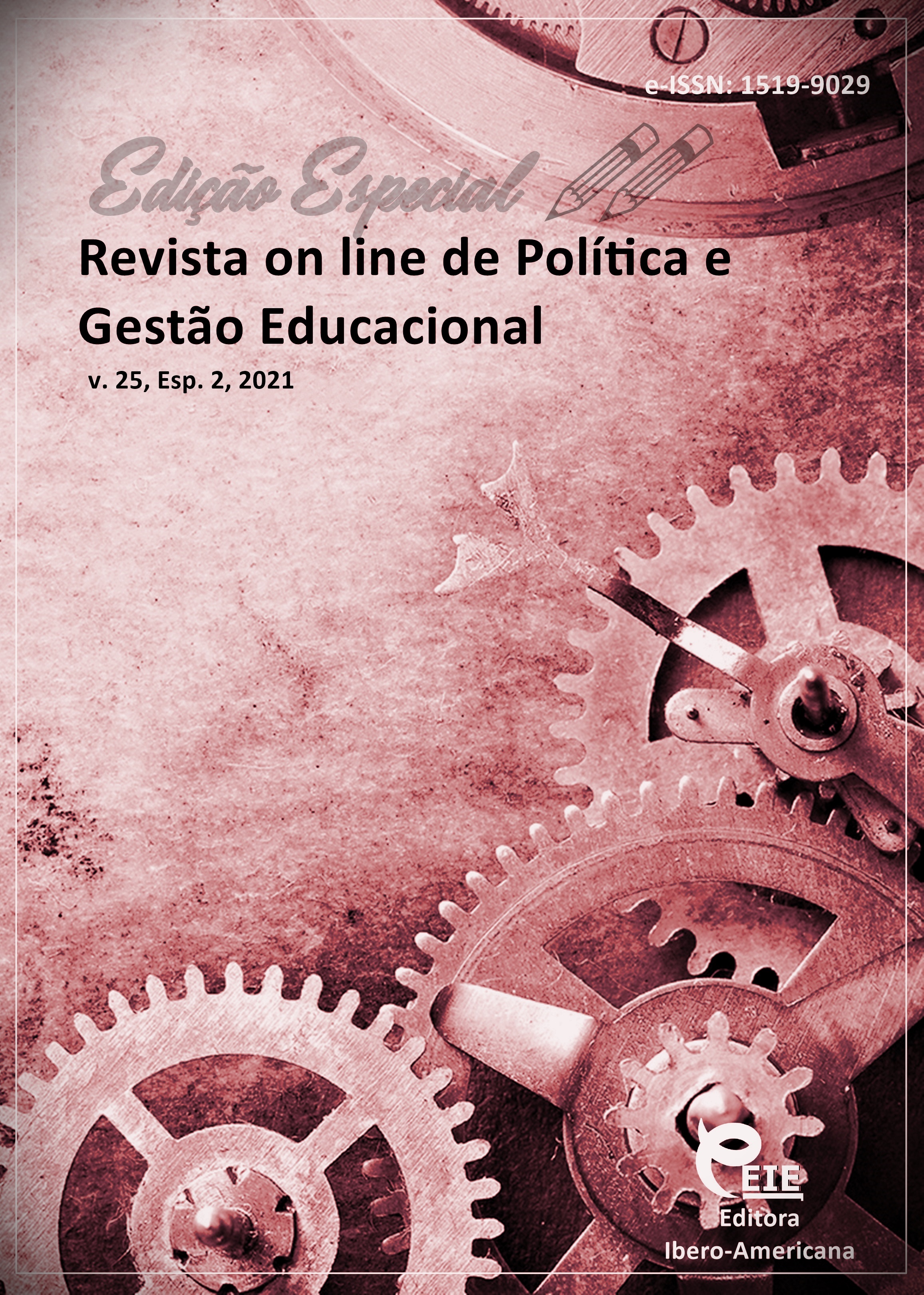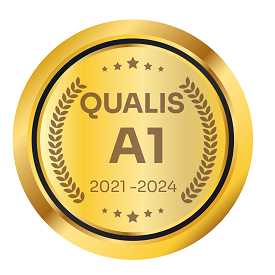Principios metodológicos para organizar el trabajo educativo de las instituciones educativas en la realidad digital
DOI:
https://doi.org/10.22633/rpge.v25iesp.2.15279Palabras clave:
Principios metodológicos, Actividades educativas, Nativos digitalesResumen
En este artículo pretendemos problematizar los principios metodológicos de la organización del trabajo educativo de las instituciones educativas en el contexto de las tendencias modernas en una sociedad en transformación. Los autores enfatizan la inconsistencia y multiplicidad de condiciones para el desarrollo mental y personal de una persona en el contexto de la realidad digital. La adopción de documentos estratégicos que establecen las direcciones obligatorias de las actividades educativas en todos los niveles de la educación requiere una comprensión de las tradiciones existentes de enseñanza y educación. Los autores señalan la insuficiente elaboración de antecedentes teóricos y metodológicos de la educación de los niños de la sociedad digital - “nativos digitales”, insuficiente análisis de la efectividad y eficiencia de las tecnologías y recursos educativos digitales utilizados. El artículo presenta una visión fundamental de la organización del trabajo educativo: como sistema y como actividad conjunta. Los autores están convencidos de que para la organización de una socialización relativamente controlada socialmente de los miembros de la sociedad, para la transmisión de la cultura y las normas sociales, es necesario actualizar los principios metodológicos de sistematización, el principio ambiental, el principio de valores comportamentales, el principio de producibilidad, el principio de inclusión de las características de la edad individual y el principio de implicación emocional.
Descargas
Citas
ASMOLOV, A. G.; GUSELTSEVA, M. S. Value sense of sociocultural modernization of education: from reforms to reformation. RSUH/RGGU Bulletin: Psychology. Pedagogics. Education Series, v. 1, p. 18-43, 2019.
BENINGHOF, A.M. Co-teaching that works: structures and strategies for maximizing student learning. San Francisco: Jossey-Bass, 2020.
BIESTA, G. Touching the soul? exploring an alternative outlook for philosophical work with children and young people. Childhood & Philosophy, v. 13, n. 28, p. 415-137, 2017.
BROD, G. generative learning: which strategies for what age? Educ Psychol Rev., 2020. DOI: https://doi.org/10.1007/s10648-020-09571-9
CONTAGE, G. D. Infância e invisibilidade: por uma pedagogia do oculto. Childhood & Philosophy, v. 15, p. 1-15, 2019. DOI: https://doi.org/10.12957/childphilo.2019.42877
DUGAROVA, T. T. et al. Self-identity of adolescents in the cross-cultural aspect (on the example of Mongolian and Russian adolescents). Journal of Environmental Treatment Techniques, v. 8, n. 4, p. 1599-1605, 2020.
HA LE, J. J.; WUBBELS, T. Collaborative learning practices: teacher and student perceived obstacles to effective student collaboration. Cambridge Journal of Education, v. 48, n. 1, p. 103-122, 2018.
KARABANOVA, O. A.; MALOFEEV, N. N. Education development strategy for children with disabilities: On the way to implementing a cultural-historical approach. Cultural-Historical Psychology, v. 15, n. 4, p. 89-99, 2019.
KOHAN, O.W.; KENNEDY, D. Gert Biesta and philosophical work with children. Childhood & Philosophy, v. 13, n. 28, p. 409-414, 2017. DOI: https://doi.org/10.12957/childphilo.2017.30504
MENDE, S.; PROSKE, A.; NARCISS, S. Individual preparation for collaborative learning: Systematic review and synthesis. Educational Psychologist, v. 56, n. 1, p. 29-53, 2021.
PEREIRA, S.; FILLOL, J.; MOURA, P. Young people learning from digital media outside of school: the informal meets the formal. Comunicar, v. 58, p. 41-50, 2019.
PEREIRA, S.; PONTE, C. E.; ELIAS, N. Children, youth and media: current perspectives. Comunicação e Sociedade, v. 37, p. 9-18, 2020
.
PRENSKY, M. Digital natives, digital immigrants. do they really think differently? On the Horizon, v. 9, n. 6, p. 1-6, 2001.
REAN, A. A. Psychology of studying personality. Moscow: Publishing house V.A. Mikhailov, 1999.
SALAKHOVA, V. B. et al. Informational and psychological safety of the educational environment in forming a person’s personality: current challenges and risks (ecological and psychological approach). Eurasia J Biosci, v. 13, p. 1797-1803, 2019.
SALAKHOVA, V. B. et al. The crisis of education in conditions of the covid-19 pandemic: The model of blended learning. Systematic Reviews in Pharmacy, v. 11, n. 12, p. 1411-1416, 2020.
SANTI, M. Collaborative problem-solving and citizenship education: a philosophical escape in the age of competencies. Childhood & Philosophy, v. 15, p. 1-19, 2019.
STRATEGY FOR THE EDUCATION DEVELOPMENT. Strategy for the Education Development in the Russian Federation for the period up to 2025. Moscow: Government of the Russian Federation, 2015.
TETZLAFF, L.; SCHMIEDEK, F.; BROD, G. Developing personalized education: a dynamic framework. Educational Psychology Review, 2020. DOI: https://doi.org/10.1007/s10648-020-09570-w
TURKLE, S. Alone together: why we expect more from technology and less from each other. New York: Basic Books, 2010.
VOISKUNSKII, A. E.; SOLDATOVA, G. U. Epidemic of Loneliness in a Digital Society: Hikikomori as a Cultural and Psychological Phenomenon. Konsul'tativnaya psikhologiya i psikhoterapiya. Counseling Psychology and Psychotherapy, v. 27, n. 3, p. 22-43, 2019.
Publicado
Cómo citar
Número
Sección
Licencia
Derechos de autor 2021 Revista on line de Política e Gestão Educacional

Esta obra está bajo una licencia internacional Creative Commons Atribución-NoComercial-CompartirIgual 4.0.
Manuscritos aceitos e publicados são de propriedade da Revista on line de Política e Gestão Educacional. É vedada a submissão integral ou parcial do manuscrito a qualquer outro periódico. A responsabilidade do conteúdo dos artigos é exclusiva dos autores. É vedada a tradução para outro idioma sem a autorização escrita do Editor ouvida a Comissão Editorial Científica.











